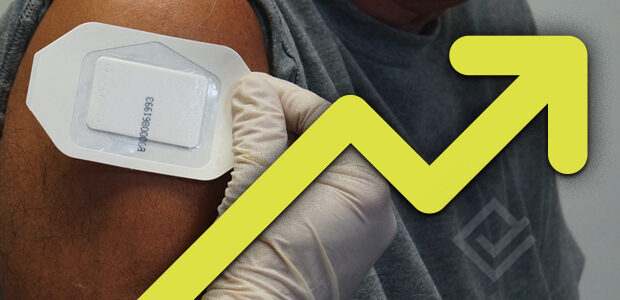Driving Accountability and Long-Term Change with Incentives and the PharmChek® Sweat Patch

December 13, 2024
In drug courts, judges, attorneys, and treatment professionals guide participants toward sobriety using tools that foster accountability and inspire change. Substance use disorder (SUD) is a chronic illness requiring more than punishment for noncompliance. Combining vigilant monitoring, effective treatment, and meaningful incentives provides the structure needed for sustainable recovery.
Evidence shows that recovery incentives can change behavior, build confidence, and instill hope. When paired with innovative tools like the PharmChek® Sweat Patch, these strategies create an environment where participants can achieve long-term sobriety and personal growth. This article explores how recovery incentives work and how the PharmChek® Sweat Patch supports accountability.
Why Incentives Matter in Treatment Courts
Behavioral change is never easy, and for drug court participants, it can feel impossible. Many face challenges such as mental health issues, trauma, limited resources, and low motivation. These barriers make incentives essential for engaging participants and fostering progress.
Incentives are more than rewards—they validate effort, build trust, and encourage compliance. By shifting the focus from punishing failures to celebrating successes, courts create a positive environment that motivates participants to stay engaged. Small acknowledgments, like sobriety milestone certificates or praise in court, create a tangible link between effort and reward, encouraging participants even when recovery feels challenging.
The Power of Purpose During Recovery

Tabitha Arnsdorf
For recovery incentives to be most effective, they should align with participants' personal goals. When individuals see how their progress connects to what matters most in their lives, they are more likely to stay committed.
Tabitha Arnsdorf, a recovering addict who now works as a case manager in the same drug court that changed her life, illustrates the power of purpose. Here’s what she had to share about how her desire to provide a better life for her son became the driving force behind her recovery.
“A lot of recovering addicts base their life off of twelve steps. Mine is based on a life purpose. I wasn’t doing it for me; I was doing it for him. I loved him enough to know that he deserved a better life. When you first enter into the program, you have psychologists and case managers who ask you about your goal. ‘I want to live a sober life,’ or ‘I want to maintain my sobriety.’ Of course, we want to stay clean, but if that’s your goal, then you’re just clean. Make a goal that is your life’s purpose. What is something you want so bad that it’s going to keep you clean? If your life purpose is to run a business or be the best grandma, drugs won’t let you do any of those things. Have a goal so rich that staying clean is just part of it, but not the goal itself.”
Tabitha’s story highlights how incentives tied to meaningful, personal aspirations can motivate participants to persevere and take ownership of their recovery.
How Incentives Work in Practice
For incentives to succeed, they must be delivered with consistency, immediacy, and fairness. When courts reliably track progress and reward positive behaviors promptly, participants see a clear connection between their actions and rewards.
Judges and court teams use a variety of strategies to engage participants:
Social Recognition
Public praise during court hearings makes participants feel valued. Judges who celebrate even small victories show participants that their efforts matter.
Tokens of Progress
Tangible items like certificates, wristbands, or favorite snacks serve as reminders of accomplishments, reinforcing a sense of pride.
Opportunities for Choice
Allowing participants to choose rewards, like reduced community service hours or virtual reporting passes, ensures the incentive feels meaningful to them.
Low-cost or no-cost incentives, when tied to personal motivations, can be as impactful as expensive rewards. Successful programs adapt these strategies to meet participants where they are, building trust and engagement along the way.
The Role of Drug Testing in Accountability and Incentivization
Vigilant monitoring is the foundation of any successful treatment court. Drug testing plays a critical role in detecting noncompliance and affirming positive progress, ensuring that courts can respond appropriately. The PharmChek® Sweat Patch stands out as a unique and effective tool for this purpose.
Unlike traditional urine tests, which provide only snapshots of recent substance use, the PharmChek® Sweat Patch offers continuous drug testing for up to 7 to 10 days. Worn directly on the skin, it collects sweat to detect drug use, eliminating gaps in testing. This reliable, tamper-evident system gives courts the confidence to celebrate achievements and intervene when necessary.
The tamper-evident design also fosters personal responsibility. Participants know that mishandling the patch results in automatic failure, teaching them to take ownership of their recovery journey. Tabitha described this accountability as a turning point in her program:
“What PharmChek® can do for you is teach you responsibility. I knew I had to take care of the patch. If I came back and it was messed up, that was an automatic failure. So PharmChek® teaches you to do something correctly. The first time I was asked to wear one, it was a proud moment. Getting PharmChek® means you’ve followed the program well enough to go out of town.”
By providing consistent feedback and tangible rewards, the PharmChek® Sweat Patch motivates participants like Tabitha to stay compliant and focused on their recovery milestones.
Integrating the PharmChek® Sweat Patch into Recovery Programs
Recovery is a journey, and the right tools can make all the difference. The PharmChek® Sweat Patch supports accountability and progress by providing continuous monitoring that offers immediate feedback. This real-time observation becomes a powerful motivator, reinforcing the importance of staying sober.
The patch also reduces the stress of frequent urine testing. Participants no longer need to schedule regular tests, freeing up more time to focus on treatment and recovery goals. For many, this shift feels like a reward—fewer interruptions make accountability easier to manage and maintain.
A Culture of Progress: Incentives Paired with Effective Monitoring
The key to long-term success in treatment courts lies in fostering a culture that prioritizes progress over perfection. Recovery incentives, paired with reliable monitoring tools like the PharmChek® Sweat Patch, create a supportive framework for participants. Together, they encourage individuals to embrace change while holding themselves accountable.
Imagine a participant celebrating 30 days of sobriety with the support of the PharmChek® Sweat Patch. Their negative test results are recognized in court with applause, a certificate, and perhaps a token of appreciation, like a note from the judge. These moments affirm their hard work and inspire confidence for the road ahead.
The Lasting Impact of Sobriety Incentives
For many participants, incentives are stepping stones to a brighter future. Small acts of recognition and encouragement ignite hope, showing individuals that their efforts matter. Combined with reliable tools like the PharmChek® Sweat Patch, recovery incentives empower participants to take ownership of their journey.
The benefits extend beyond the individual. Participants who engage with incentives and stay compliant often inspire their peers to do the same. This ripple effect builds a stronger treatment court community where everyone feels supported and motivated to succeed.
Turning Efforts into Enduring Success
In drug courts, where accountability and compassion intersect, recovery incentives and effective monitoring tools like the PharmChek® Sweat Patch play an indispensable role. Together, they create a pathway to sobriety that is supportive and structured, motivating participants to embrace change and build new lives.
By recognizing progress, rewarding effort, and leveraging reliable drug testing, treatment courts can help participants turn their challenges into enduring success. The journey may be tough, but with the right tools and strategies, lasting recovery is possible.